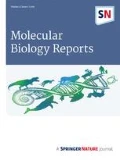Abstract
Pyruvate kinase M2, an important metabolic enzyme, promotes aerobic glycolysis (Warburg effect) to facilitate cancer cell proliferation. Unravelling the status of this important glycolytic pathway enzyme under sub-lethal doses of etoposide, a commonly used anti-proliferative genotoxic drug to induce mild/moderate DNA damage in HeLa cells as a model system and discern its effect on: PKM2 expression, phosphorylation, dimer: tetramer ratio, activity and associated effects, was pertinent. Protein expression and phosphorylation of PKM2 from HeLa cells was estimated using Western blotting. Same protein lysate was also used to estimate total pyruvate kinase activity and the total dimer: tetramer content evaluated using glycerol gradient ultra-centrifugation. Intracellular PEP was estimated manually using standard curve; while NADPH was assessed by NADPH estimation kit. Unpaired t test and two-way-ANOVA was used for statistical analysis. A relative decrease in PKM2 expression and a subsequent dose and time dependent increase in Y105-phosphorylation were observed. A concomitant increase in PKM2 dimer content and Y105-phosphorylation responsible for reduced PKM2 activity promoted PEP accumulation and NADPH production, representing increased metabolic flux into PPP, a feature that favours cancer cells. It was apparent that the sub-lethal doses of etoposide induced inadequate damage to DNA in cancer cells in culture promoted pro-survival conditions due to Y105-phosphorylation of PKM2, its stable dimerization and inactivation, a unique association not known earlier, indicating what might happen in tumour revivals or recurrences.

Abbreviations
- PKM2:
-
Pyruvate kinase M2
- PPP:
-
Pentose phosphate pathway
- PEP:
-
Phosphoenol pyruvate
- NADPH:
-
Nicotinamide adenine dinucleotide phosphate reduced
- FBP:
-
Fructose-1,6-bisphosphate
References
Valentini G, Chiarelli L, Fortin R, Speranza ML, Galizzi A, Mattevi A (2000) The allosteric regulation of pyruvate kinase. J Biol Chem 275:18145–18152
Kayne FJ, Price NC (1973) Amino acid effector binding to rabbit muscle pyruvate kinase. Arch Biochem Biophys 159:292–296
Christofk HR, Vander Heiden MG, Harris MH, Ramanathan A, Gerszten RE, Wei R, Fleming MD, Schreiber SL, Cantley LC (2008) The M2 splice isoform of pyruvate kinase is important for cancer metabolism and tumour growth. Nature 452:230–233
Mazurek S, Boschek CB, Hugo F, Eigenbrodt E (2005) Pyruvate kinase type M2 and its role in tumor growth and spreading. Semin Cancer Biol 15:300–308
Deberardinis RJ, Sayed N, Ditsworth D, Thompson CB (2008) Brick by brick: metabolism and tumor cell growth. Curr Opin Genet Dev 18:54–61
Zwerschke W, Mazurek S, Massimi P, Banks L, Eigenbrodt E, Jansen-Durr P (1999) Modulation of type M2 pyruvate kinase activity by the human papillomavirus type 16 E7 oncoprotein. Proc Natl Acad Sci USA 96:1291–1296
Gupta V, Kalaiarasan P, Faheem M, Singh N, Iqbal MA, Bamezai RN (2010) Dominant negative mutations affect oligomerization of human pyruvate kinase M2 isozyme and promote cellular growth and polyploidy. J Biol Chem 285:16864–16873
Hitosugi T, Kang S, Vander Heiden MG, Chung TW, Elf S, Lythgoe K, Dong S, Lonial S, Wang X, Chen GZ, Xie J, Gu TL, Polakiewicz RD, Roesel JL, Boggon TJ, Khuri FR, Gilliland DG, Cantley LC, Kaufman J, Chen J (2009) Tyrosine phosphorylation inhibits PKM2 to promote the Warburg effect and tumor growth. Sci Signal 2:ra73
Lv L, Xu YP, Zhao D, Li FL, Wang W, Sasaki N, Jiang Y, Zhou X, Li TT, Guan KL, Lei QY, Xiong Y (2013) Mitogenic and oncogenic stimulation of K433 acetylation promotes PKM2 protein kinase activity and nuclear localization. Mol Cell 52:340–352
Iqbal MA, Gupta V, Gopinath P, Mazurek S, Bamezai RN (2014) Pyruvate kinase M2 and cancer: an updated assessment. FEBS Lett 588:2685–2692
Lunt SY, Muralidhar V, Hosios AM, Israelsen WJ, Gui DY, Newhouse L, Ogrodzinski M, Hecht V, Xu K, Acevedo PN, Hollern DP, Bellinger G, Dayton TL, Christen S, Elia I, Dinh AT, Stephanopoulos G, Manalis SR, Yaffe MB, Andrechek ER, Fendt SM, Vander Heiden MG (2014) Pyruvate kinase Isoform expression alters nucleotide synthesis to impact cell proliferation. Mol Cell 57(1):95–107
Iqbal MA, Siddiqui FA, Gupta V, Chattopadhyay S, Gopinath P, Kumar B, Manvati S, Chaman N, Bamezai RN (2013) Insulin enhances metabolic capacities of cancer cells by dual regulation of glycolytic enzyme pyruvate kinase M2. Mol Cancer 12:72
Kalaiarasan P, Subbarao N, Bamezai RN (2014) Molecular simulation of Tyr105 phosphorylated pyruvate kinase M2 to understand its structure and dynamics. J Mol Model 20:2447
Acknowledgments
RNKB acknowledges University Grants Commission, Government of India by whom research was funded. The funders had no role in study design, data collection and analysis, decision to publish, or preparation of the manuscript. BK acknowledges Council for Scientific and Industrial Research for providing fellowship.
Conflict of interest
None.
Author information
Authors and Affiliations
Corresponding author
Rights and permissions
About this article
Cite this article
Kumar, B., Bamezai, R.N.K. Moderate DNA damage promotes metabolic flux into PPP via PKM2 Y-105 phosphorylation: a feature that favours cancer cells. Mol Biol Rep 42, 1317–1321 (2015). https://doi.org/10.1007/s11033-015-3876-8
Received:
Accepted:
Published:
Issue Date:
DOI: https://doi.org/10.1007/s11033-015-3876-8

